News
South Africa may lose U.S. trade benefit after target missed

Health authorities to meet to resolve outstanding issues; U.S. may exclude South African farming goods from AGOA benefit
South Africa said it missed a Dec. 31 deadline set by the U.S. to resolve a trade dispute between the two countries, putting it at risk of losing duty-free access on its agricultural exports to the world’s largest economy.
Health authorities from the two nations have yet to reach agreement on safety standards related to chicken and beef imports from the U.S., Trade Minister Rob Davies said. U.S. President Barack Obama will now decide whether South African farming goods will be excluded from a preferential trade agreement known as the African Growth and Opportunity Act, or AGOA.
The U.S. has accused South Africa of imposing several longstanding barriers to American exports and gave the nation 60 days from Nov. 6 to resolve concerns or face suspension of trade preferences on products such as citrus fruit, macadamian nuts and avocados under AGOA.
“We are recognizing that we are in extra time,” Davies told reporters in Pretoria. “The whistle hasn’t at this moment been blown and we are hoping that the whistle will not be blown to give the authorities on both sides an opportunity to engage again. We are committed to finding a solution.”


The trade accord between the U.S. and 39 African countries eliminates import levies on more than 7,000 products ranging from textiles to manufactured items. To remain beneficiaries, countries are required to eliminate barriers to U.S. trade and investment, operate a market-based economy, protect workers’ rights and implement economic policies to reduce poverty.
The trade program has helped South Africa more than double its exports to the U.S. since 2000. South African agricultural exports to the U.S. under AGOA amounted to $154 million in the first nine months of last year, according to the Trade Law Centre, which is based in Stellenbosch, near Cape Town. Total two-way trade between the two nations was about $14 billion in 2014.
The process has “dented South Africa’s relationship with the U.S., especially because President Obama was such a big supporter of South Africa’s inclusion in the renewed AGOA program while a lot of people opposed it,” Cyril Prinsloo, a researcher at the Johannesburg-based South African Institute of International Affairs, said in an interview in Pretoria. “Trade negotiations always take long, it’s always an extended process. The fact that after the 6O days all the issues are still not resolved is somewhat disappointing.”
Veterinary authorities from the two nations will meet on Jan. 6, according to Davies. If it loses some trade benefits, South Africa can reapply for full AGOA access once the dispute is resolved and preferences can be speedily restored, he said.
Wine Exports
“We are continuing to work with South Africa to remove the barriers that block American poultry, beef and pork,” Trevor Kincaid, a spokesman for the office of the U.S. Trade representative in Washington, said in an e-mailed response to questions on Monday. “As of today’s deadline, outstanding issues have not been resolved.”
The U.S. will determine which South Africans goods can be excluded from AGOA. Davies said he was unsure whether wine exports may be affected.
“South African wine accounts for about 1 percent of consumption in the U.S., yet they are our fifth-biggest export market,” Jonathen Ralph, general manager for the Americas at KWV Holdings Ltd., one of the country’s biggest wine and spirit companies, said by phone from Paarl, near Cape Town. “It’s going to be very detrimental to the wine industry” if exports are excluded.
About 78 percent of South Africa’s agricultural exports to the U.S under AGOA come from the Western Cape, the only one of the nine provinces not controlled by the country’s ruling African National Congress.
“The agricultural issues are vital for us and the sector is already under enormous pressure,” Alan Winde, the province’s economic development minister, said by phone. “I am angry that the Department of Trade and Industry has not concluded these negotiations.”
A deal is still likely to be struck, according to Faizel Ismail, South Africa’s special envoy to AGOA.
“It’s the last part of the marathon,” he said in an interview in Cape Town. “Both parties have a deep interest in finalizing the last 5 percent. You can’t give up at this stage on either side. We both have much to lose.”
» Read: South Africa on outstanding AGOA issues | Media statement, 4 January 2016




